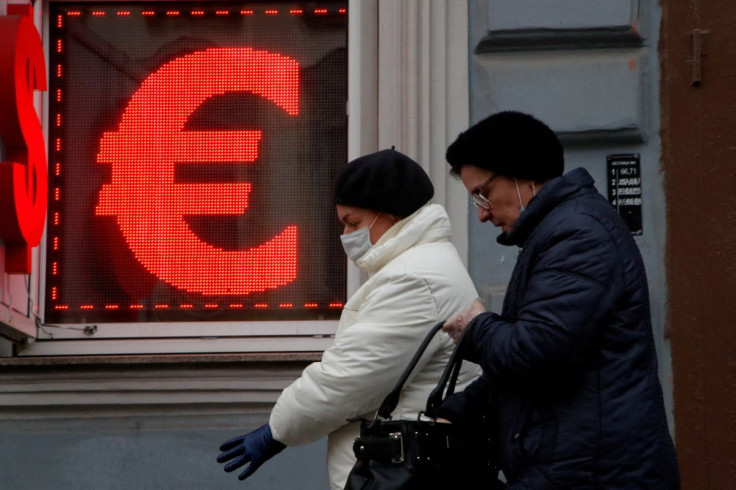Euro Wavers As Traders Await EU Policy Response To War In Ukraine

The euro shed some of its overnight gains on Thursday after its steepest daily jump since 2016 as traders waited for a European Central Bank meeting and a European Union summit to shed light on the bloc's policy response to Russia's invasion of Ukraine.
The common currency on Wednesday benefited from a risk-on shift in sentiment which lifted equity markets and bond yields and saw oil prices drop amid optimism about diplomatic efforts to solve what the Kremlin refers to as a "special operation" to disarm Ukraine.
The euro has been widely seen as a gauge of Europe's biggest security crisis since 1945 and touched a 22-month low of $1.0804 earlier in the week with investors expecting a sizeable impact on European growth.
At 0849 GMT, the euro was trading at $1.10489, down 0.32% after jumping 1.6% on Wednesday, its best day since June 2016.
Traders were looking to the ECB meeting later in the day for clues about how policy makers will balance the risk of higher inflation with the damage war in Ukraine will cause to economic growth.
"We think that normalization of monetary policy is likely to be delayed but not derailed", Unicredit analysts wrote in a morning note.
Investors currently expect the central bank to gradually phase out its pandemic bond buying scheme and hike its key interest rate by a total of about 33 basis before the end of the year.
The ECB is trailing other major central banks such as the U.S. Federal Reserve and the Bank of England in the post-pandemic tightening cycle which has weighed on the euro.
Recent reports that EU leaders were considering joint bond issuance to finance energy and defence spending has however boosted the currency. The bloc's summit will begin later today in Versailles, west of Paris.
The dollar index was up 0.2% after falling 1.17% on Wednesday and traders were waiting for U.S. inflation figures, also due later in the day, to further guide expectations for the Federal Reserve's meeting next week.
While the Fed is widely expected to raise its benchmark overnight interest rate by a quarter of a percentage point, growing calls before the war for a larger half a percentage point rise have quietened.
Economists polled by Reuters forecast the U.S. Consumer Price Index to have climbed 7.9% on a year-on-year basis in February, up from 7.5% in January, although this data will only show a preliminary impact from the surge in oil prices caused by the conflict.
Elsewhere, sterling was down 0.2% at $1.3159 after jumping 0.65% overnight along with the euro, while the safe-haven yen was at 115.88 per dollar, close to its lowest in a month, hurt by a rise in sentiment towards riskier assets like equities.
Asian stocks rallied on Thursday, echoing overnight gains on Wall Street where a tumble in oil prices sent stocks higher.
© Copyright Thomson Reuters 2024. All rights reserved.





















